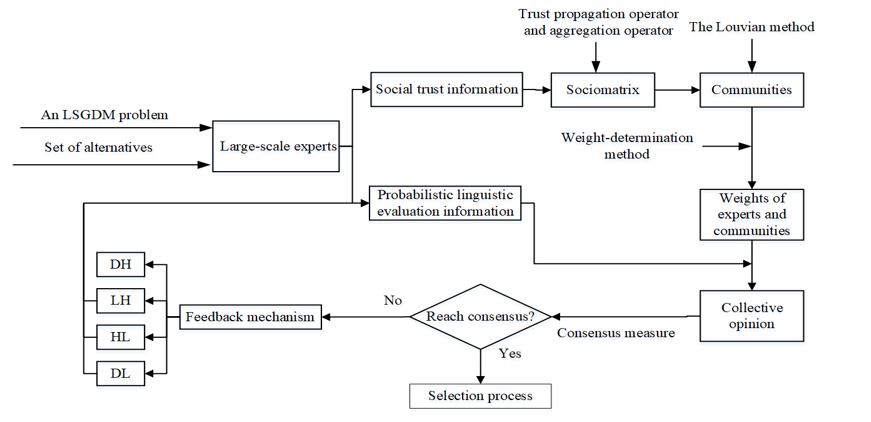Video Article Open Access
A Large-Scale Group Decision Making Method based on Social Network Analysis for Computer-Aided Material Selection
Huchang Liao*, Xiaofang Li, Ming Tang
Business School, Sichuan University, Chengdu, 610064, China
Vid. Proc. Adv. Mater., Volume 3, Article ID 2203266 (2022)
DOI: 10.5185/vpoam.2022.03266
Publication Date (Web): 21 Jul 2022
Copyright © IAAM
Graphical Abstract

Abstract
With the rapid development of societal and technological paradigms, large-scale group decision making becomes an emerging topic. In conventional group decision making methods, it is often assumed that all experts are independent. However, with the expansion of social media, experts usually have some relationships and get together for some reasons such as the academic relationship, working relationship or common interests. In these cases, experts are no longer independent individuals. To address the issue, this study introduces a large-scale group decision making model based on the social network analysis. In this model, experts can provide trust values on other experts. Due to the scale and complexity of the large-scale group decision making problems, the dimensional reduction, which uses community detection to classify experts into local communities, is deemed essential. Based on this process, the whole group can be divided into two layers. The first layer is the global network containing all communities, and the second layer is the local network within a community. This study develops a model to address large-scale group decision-making problems considering the local and global consensus in two layers simultaneously. This model allows experts to use probabilistic linguistic preference relations to express their cognitive complex evaluation information. An illustrative example is presented to show the usefulness of the proposed model. It should be noted that this method is applicable and effective in various problems about computer-aided advanced material evaluation, selection, design and manufacturing.
Keywords
Group decision making; social network analysis; probabilistic linguistic preference relations; consensus; community detection.
References
- Liao, H.C.; Li, X.F.; Tang, M.; How to process local and global consensus? A large-scale group decision making model based on social network analysis with probabilistic linguistic information, Information Sciences, 2021, 579, 368-387.
- Pang, Q.; Wang, H.; Xu, Z.S.; Probabilistic linguistic term sets in multi-attribute group decision making. Information Science, 2016, 369, 128-143.
- Tang, M.; Liao, H.C.; From conventional group decision making to large-scale group decision making: What are the challenges and how to meet them in big data era? A state-of-the-art survey, Omega, 2021, 100, 102141. DOI: 10.1016/j.omega.2019.102141.
- Ureña, R.; Chiclana, F.; Melançon, G.; Herrera-Viedma, E.; A social network based approach for consensus achievement in multiperson decision making, Information Fusion, 2019, 47, 72-87.
- Leicht, E.A.; Newman, M.E.J.; Community structure in directed networks, Physical Review Letters, 2008, 100, 118703. DOI: 10.1103/PhysRevLett.100.118703.
Biography
Huchang Liao is a Research Fellow at the Business School, Sichuan University, Chengdu, China. He received his PhD degree in Management Science and Engineering from the Shanghai Jiao Tong University, Shanghai, China, in 2015. He has published 3 monographs, and more than 300 peer-reviewed papers, many in high-quality international journals including European Journal of Operational Research, Omega, Annals of Operations Research, Journal of the Operational Research Society, OR Spectrum, IEEE Transactions on Fuzzy Systems, IEEE Transactions on Engineering Management, IEEE Transactions on Systems, Man, and Cybernetics: Systems, IEEE Transaction on Cybernetics, etc. His publications have been cited over 11,000 times, and his h-index is 58. He has been a Highly Cited Researcher in Computer Science (2019-2021) and Engineering (2020-2021), and a Highly Cited Chinese Researchers in Management Science (2020). He was within the top 2% Ranking of Scientists in the World by Stanford University in 2021, in which he ranked top 14400 in all Scientists. He ranked top 22187 in the top 100,000 scientist ranking list all over the word (http://www.globalauthorid.com). His current research interests include Multiple criteria decision analysis, Fuzzy set and systems, Cognitive computing, Healthcare management, Logistics engineering, etc. Prof. Liao was elected to be the Fellow of BCS (British Computer Society) in November 2021, and the Jr. Fellow of IAAM (International Association of Advanced Materials) in December 2020. He has been the Senior Member of IEEE since 2017. He is the Editor-In-Chief, Associate Editor, Guest Editor or Editorial Board Member for more than 30 international journals, including IEEE Transactions on Fuzzy Systems (SCI), Information Fusion (SCI), Applied Soft Computing (SCI), Technological and Economic Development of Economy (SSCI), International Journal of Strategic Property Management (SSCI), and International Journal of Fuzzy Systems (SCI). He has received numerous honors and awards, including the Outstanding scientific research achievement award in higher institutions in China (First class in Natural Science in 2017; Second class in Natural Science in 2019), the Social Science Outstanding Achievement Award in Sichuan Province (Second Class in 2019), the Natural Science Research Achievement Award in Sichuan Province (Third class, in 2021), and the 2015 Endeavour Research Fellowship award granted by the Australia Government.
Video Proceedings of Advanced Materials

Upcoming Congress



